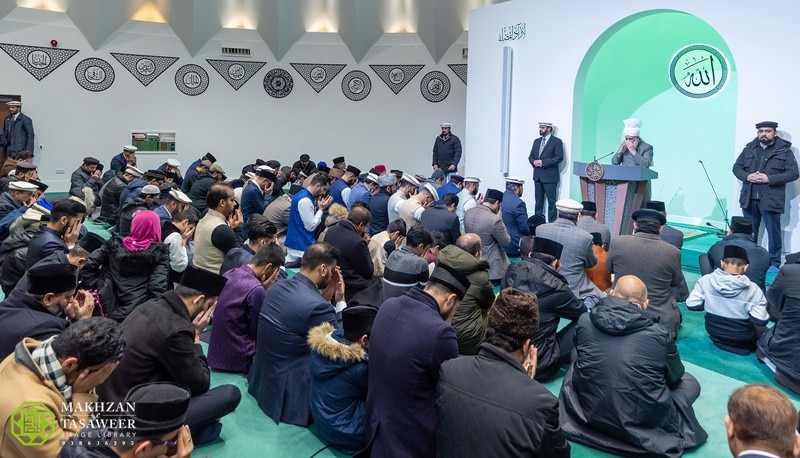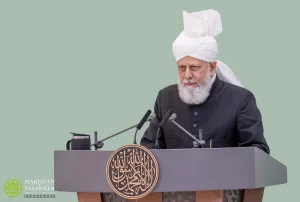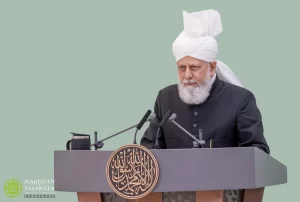The search for a perfect life partner is high up in most people’s life goals. And once we discover our perfect match, the highs and lows of relationships consume much of our energy and emotions. The Review of Religions is pleased to launch this new series ‘Life Lessons for a Happy Marriage.’ What can you expect in this series? We present the English translations of the guidance imparted by His Holiness (aba) on such occasions of Nikah. We have included only those parts of the Nikah sermons in which His Holiness (aba) has imparted advice, and left out specific details such as names and dowry. This is the first time these have been translated into English. From time to time we will feature guidance from His Holiness (aba) on marriage and relationships on other occasions as well. We are keeping these segments short, bite-size, and digestible so you can take away short tips every time you read any part of this series.
Nikah is the Islamic marriage announcement, where two sides declare acceptance of their new matrimonial union. In doing so, they vow to abide by the commandments of God and treat their spouse in the best manner and make righteousness the basis of their relationship.
On certain occasions, while announcing a Nikah, The Fifth Caliph and Worldwide Head of the Ahmadiyya Muslim Community, His Holiness, Hazrat Mirza Masroor Ahmad (aba) imparts invaluable words of advice. These should be heeded not only by the new couples but by all who wish to establish true peace and success, in their relationships and homes.

Members join His Holiness (aba) in silent prayers after a Nikah (photo taken pre-pandemic)
On 28 January 2012, His Holiness, Hazrat Mirza Masroor Ahmad (aba) made an announcement of Nikah ceremonies in Fazl Mosque, London. After reciting Tashahhud, Ta‘awwuz and the Qur’anic verses of Nikah, His Holiness (aba) stated:
‘Allah the Almighty has placed a facet in human nature which causes one to worry about their future. Even an average man wakes up every day and goes to work, because he is concerned that if he does not go to work, then his hours may be wasted, and his business could be ruined in the future. Employment is his means of earning. If he does not go to work, he could be fired from his job, and as a result, his future in the world could look bleak. Every person, anyone at all, certainly thinks about their future in their own personal scopes. And like I have said, to do so is human nature. Our elders, who were married a long time ago and whose children have grown up, are also constantly thinking about the future; worrying about the preservation of their families and about safeguarding their children. They continue to worry about the future of their children when they enter adolescence. When the children grow older, the elders worry about their education. Then, when their children have obtained an education, the elders are concerned about them finding a good job. When they have acquired a good job, then the elders worry about a suitable marriage proposal for the perpetuation of their lineage.
There is an aspect of human cognition that always looks out for the future, but this vision of the future is ephemeral. This future is such that it will end with a person’s life – a life of fifty, sixty, seventy, a hundred or however many years. But a mo’min – an individual who has complete faith in God Almighty – also thinks about the future that is the life in the hereafter; a future destined for after the completion of this life. A mo’min strives to attain this. His concerns are not only for acquiring paradise on earth; he is not only concerned for the comforts of this world, nor is his objective to try and protect himself from the torment of this world. Rather, his concerns are for the procurement of the hereafter, which is the true paradise. [That paradise] is to protect him from that hell where the fire could be fuelled by stone and man. Therefore, if a person worries for his future and prepares for it while constantly praying Istighfar [prayer for seeking forgiveness], then he is a true m’omin. For this reason, at the time of Nikah (marriage) when one is trying to build toward a future, Allah the Almighty has greatly emphasised the observance of Taqwa [righteousness].
The Qur’anic verses selected by the Holy Prophet (sa) for the Nikah sermon make mention of Taqwa, so that you can think about a future that could forever make you a beneficiary of paradise. A boy and a girl are joined in matrimony. They have desires. The girl has her own desires. Taking her future with her, she leaves her home in hopes that she will settle in a new home. [She desires] that they will have children, that a new life with her husband will commence, and that there will be a future. A boy, too, marries wishing for a future. He marries for the propagation of future generations, as though it is a chain of succession. But, they are both reminded that the crux of the matter is Taqwa. Seek this future and strive for it in this world, and when you are getting married, go forward with the mindset that you have to fulfil the rights of humankind, which are just as important as the rights due to Allah. When we fulfil these rights, then we would actually be able to attain our true future; we would be the ones to see tomorrow.
Allah has instructed us to be mindful of tomorrow. What is “tomorrow”? Tomorrow is our future, which is the life after this life; it is a prayer to Allah for seeking the opportunity to continue to do good tomorrow, after doing good today. Looking to tomorrow is not restricted to envisioning your future life, rather it is to take a step forward from what you did today. At night, evaluate and plan how you can improve your tomorrow and make it better than today. Therefore, this is a continuing course that one should always keep in sight.
[Among the life-devotees], there are those who dedicate their lives for their faith, or those whose parents dedicate them with the promise that ‘whatever is born to us, I dedicate her in the cause of faith and, God willing, she becomes a true servant of faith.’ [The parents] devote their sons as well as their daughters. Girls are not excluded in this matter. So, when such children are growing up and getting married, they should make the pleasure of Allah their sole objective. Only this can lead to that better future which is the ultimate goal of human life. Therefore, those life-devotees who are becoming murabbis (missionaries), as well as the waqfat-e-nau (female life-devotees), should always be mindful that they must give precedence to Allah’s will over worldly objects at all costs and be prepared to offer every sacrifice for the sake of their faith. We must fulfil this pledge that we make by any means necessary, Insha’Allah [God-willing].May Allah enable everyone to fulfil their pledge. Now with these few words, I will announce the Nikah ceremonies.
Original Urdu published in Al-Fazl International Edition: 14 February 2014
Article Source Link




